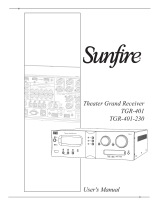Page is loading ...

Published March 20, 2005 in The Hartford Courant and the Chicago Tribune
YOUR A/V GUY
Sonic magic from Sherwood
By Kevin Hunt
Sherwood’s new VR-670 might be the rst under-$400 home theater system inspired by someone
other than Fisher-Price.
Sherwood credits Eero Saarinen, the Finnish architect whose works include the Gateway Arch in
St. Louis and Dulles Airport in Washington, D.C., as the inspiration for VR-670’s dramatically
sculpted DVD receiver. The inverted half-moon design’s silver top bleeds into a picture-window
inset that looks down onto the spinning CD or DVD, illuminated by a soothing blue backlight
and uorescent display. It’s a sultry centerpiece to this four-piece system.
A four-piece home theater? Well, yes. The VR-670 also owes something to Harry Potter, for it
almost magically replicates a complete home theater using only two speakers and a subwoofer.
The VR-670, aside from its striking good looks, is an exceptional virtual-surround-sound system.
This Hollywood-at-Home Virtual Theater System, as Sherwood (www.sherwoodamerica.com)
calls it, uses Dolby Virtual Speaker technology from Dolby Laboratories that sounds uncannily
like surround sound from two speakers.
With only two speakers and a subwoofer -- no center speaker and no rear-channel speakers -- the
VR-670 requires fewer wires and much easier setup than prepackaged systems known as home
theaters in a box. The DVD receiver includes decoding for Dolby Digital and DTS (Digital
Theater System) soundtracks, an AM/FM tuner, a 25-watt-per-channel amplier, progressive-
scan DVD player and connections for two other sources.
More than a pretty face
The standard-issue speakers, pretty in their own angular way, are not quite 9 inches high and
about 4 inches wide and deep. The subwoofer, meanwhile, makes the VR-670 more than a
fashion statement. Where so many other packaged systems use a scrawny little box ill-equipped
to reproduce so much as a baby’s burp without convulsing, Sherwood outts the VR-670 with a
legitimate, if undersize, subwoofer. It has its own amplier (50 watts), a 6-inch driver, an adjust-
able crossover frequency (more about that later) and a phase switch (which changes the phase of
the output signal by 180 degrees) -- just like a grown-up subwoofer.
And it dazzles too. Like the DVD receiver, a tiny light on the subwoofer glows blue when the
VR-670 is on, amber when in standby mode.
The crossover frequency, adjustable from 50 to 150 hertz, allows the user to alter the highest

frequency the subwoofer produces, ensuring it will blend naturally with the speakers. In the VR-
670’s case, the diminutive speakers can’t go any lower than 140 hertz, so you’d set the subwoof-
er at 140 hertz and experiment, as necessary, until dialing in the best sound.
Without this type of subwoofer and the Virtual Speaker technology, the VR-670 would be no
better off than the standard tin-can HTIB (home theater in a box). But the VR-670 can crank: The
battle scene in “Pirates of the Caribbean: The Curse of the Black Pearl” was loud, dynamic and
very much like surround sound. It created a far more believable home-theater presentation than,
say, the Niro 600 ($749, www.niro1.com), a virtual-surround system with single ve-speaker
console and brick-thick subwoofer.
Virtual Speaker is the latest development in head-related transfer functions algorithms, the
psychoacoustic technology used in other virtual-surround stereo formats like Virtual Dolby, SRS
Circle Surround and Spatializer. These number-crunching formats deliver spatial cues to the ear,
usually resulting in nothing more than a wider and slightly deeper soundeld. Virtual Speaker
takes it wider and deeper.
The downside
Music exposes the VR-670’s weakness, the front speakers. Where a movie soundtrack is usually
either dialogue or bang-’em-up special effects, music reaches across a broader spectrum. When
you ask a subwoofer to speak up at 140 hertz during a CD, you’re asking for trouble. You’ll get
too much bass, distorting the balance between highs and lows.
Fortunately, the subwoofer has a volume control on its front panel.
Sherwood has two more Hollywood-at-Home virtual systems coming, the $600 VR-700 with
a bulked-up (400 watts) subwoofer and the $250 VR-600, a more conventionally styled (as in:
square) system. Both are due in August. The VR-670 is quite a sneak preview.
/

